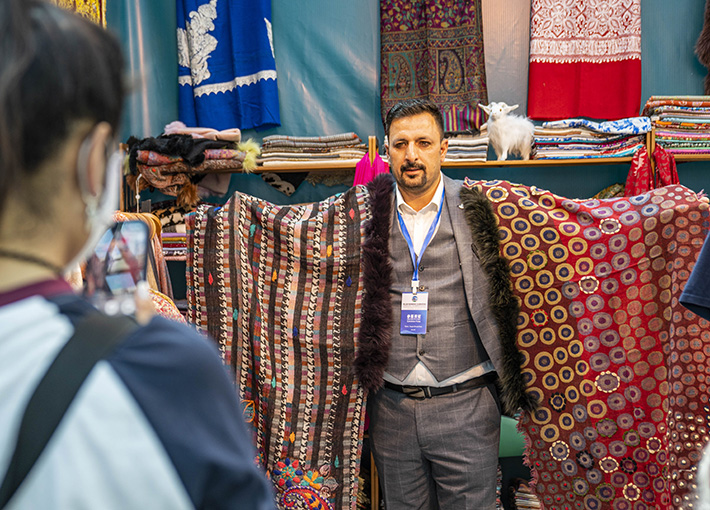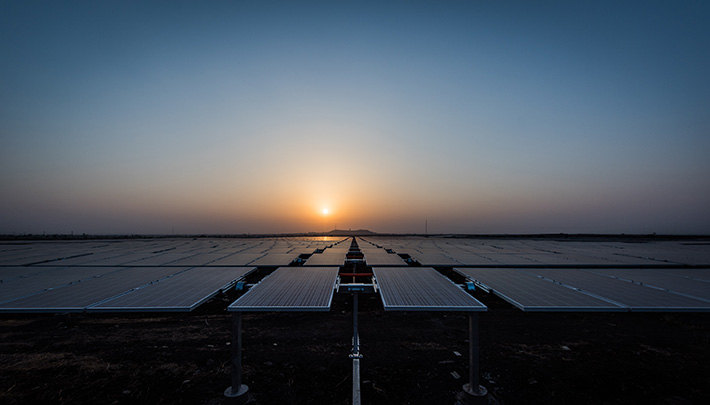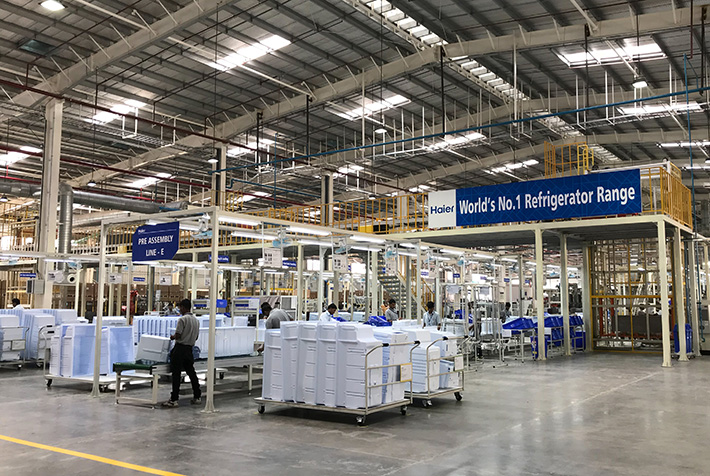|
||||||||||
| Home Nation World Business Opinion Lifestyle ChinAfrica Multimedia Columnists Documents Special Reports |
|
||||||||||
| Home Nation World Business Opinion Lifestyle ChinAfrica Multimedia Columnists Documents Special Reports |
| ChinAfrica |
| A Mechanism for Solidarity |
| The BRICS grouping provided a much-needed channel for India and China to foster economic cooperation and facilitate cordiality |
| By Josukutty C. A. | VOL. 15 August 2023 ·2023-08-11 |

An exhibitor from India displays shawls during the Fifth China Xizang Tourism and Culture Expo in Lhasa, southwest China’s Tibet Autonomous Region, on 17 June
China and India are two major emerging economies and the two most populous countries, representing about a third of the world’s population. A healthy relationship between the two countries is vital for world peace and stability. Under the spirit of peaceful coexistence envisioned by a number of measures, the bilateral relationship has been marked by “seeking common ground while preserving differences.” The key channel for further improving bilateral relations in various fields is to have effective forums to facilitate cordiality.
Although the primary focus of BRICS (Brazil, Russia, India, China and South Africa) group is to improve global governance, especially global financial governance, it also represents willingness and spirit of the member countries, especially India and China, to work together to improve bilateral ties. BRICS strives to promote a balanced, peaceful and stable world which would not be possible without China and India settling into a good bilateral relationship. It is imperative that their differences are resolved amicably and as quickly as possible, which can only be achieved through better communication at various levels fostered through confidence-building measures, especially mechanisms like BRICS.
Multiple tracks of cooperation
BRICS provides multiple platforms to facilitate cooperation among its member countries, including the BRICS summit, a BRICS leaders’ meeting on the sidelines of the G20 Summit, and more than 100 official events with 20 taking place at the ministerial level. A broad network of industry-specific contacts and cooperation within the BRICS countries involving business communities, academics and other representatives has emerged.
Cooperative mechanisms running through Track I involve formal diplomatic engagement. Track II involves engagement of government-affiliated institutions, and Track III seeks people-to-people contacts to foster development of comprehensive relationships in myriad fields. This immensely benefits sustaining channels of communication even in complex contexts and building bonhomie among interlocutors. Over time, the mechanisms will also consolidate the mutual trust that underpins BRICS initiatives.
The New Development Bank (NDB) and the Contingent Reserve Arrangement have been particularly useful. To assist member countries to address the COVID-19 pandemic, the NDB approved an emergency fund of up to $10 billion. People-to-people exchange in areas including culture, media, sports, education, film and youth has proven immensely valuable in terms of improving bilateral relationships. BRICS has consistently advocated an inclusive and win-win approach for India-China relations. It has succeeded in ensuring cooperation in many areas such as economy, finance and trade, and has promoted coordination on major international affairs.
As the world’s two largest developing countries, as well as founding members of BRICS, China and India are firm supporters and active participants of BRICS cooperation. They always make cooperation with other BRICS countries a priority in foreign policy. Currently, both countries are facing a historic mission of growing their economies and improving their people’s livelihood. China-India cooperation under the BRICS framework is always complementary. Major projects of bilateral interest include the Bangladesh-China-India-Myanmar Economic Corridor, and the two countries are working to foster a Trans-Himalayas Economic Growth Region. Mutual recognition of pharmaceutical products including COVID-19 vaccines and medicines within BRICS countries is also moving in the right direction for cooperation.

Photo taken on 10 April 2017 shows a solar power plant constructed with the assistance of Chinese enterprises near Hyderabad, capital of India’s southern state of Telangana
Mutual support and inclusive governance
Reciprocal mutual support between China and India when hosting the 13th and 14th BRICS Summits is indicative of their shared desire to build stronger China-India relations. The summits pushed BRICS countries to forge greater cooperation and build stronger bonds.
The New Delhi Declaration adopted at the 13th BRICS Summit reiterated commitment to enhancing intra-BRICS cooperation under the three pillars of politics and security, economy and finance, and cultural and people-to-people exchanges. It also emphasised the need to work together to fight COVID-19, stressed the benefits of keeping the outer space free from an arms race, strongly condemned terrorism in all forms and manifestations, and reaffirmed cooperation in a variety of fields.
The Beijing Declaration of the 14th BRICS Summit stressed “making instruments of global governance more inclusive, representative, and participatory.” It reaffirmed the need for a comprehensive reform of the United Nations, including its Security Council, with a view to making it more representative, effective and efficient, and to increase the representation of the developing countries so that it can adequately respond to global challenges. It also reiterated the need for all countries to cooperate in promoting and protecting human rights and fundamental freedoms under the principles of equality and mutual respect, and reaffirmed BRICS’ support for an open, transparent, inclusive, non-discriminatory and rules-based multilateral trading system, as embodied in the World Trade Organisation.
BRICS as a mechanism has brought India and China closer. The conceptual framework and objectives of BRICS are based on mutual understanding and accommodation towards inclusive global governance, and the BRICS forum facilitates interactions across a variety of areas of common concern. It provides a much-needed channel for India and China to communicate and negotiate.

Local employees of Haier, a Chinese home appliances and consumer electronics company, work in a production facility in Pune, India, on 16 November 2017
| About Us | Contact Us | Advertise with Us | Subscribe |
| Copyright Beijing Review All rights reserved 京ICP备08005356号-5 京公网安备110102005860号 |